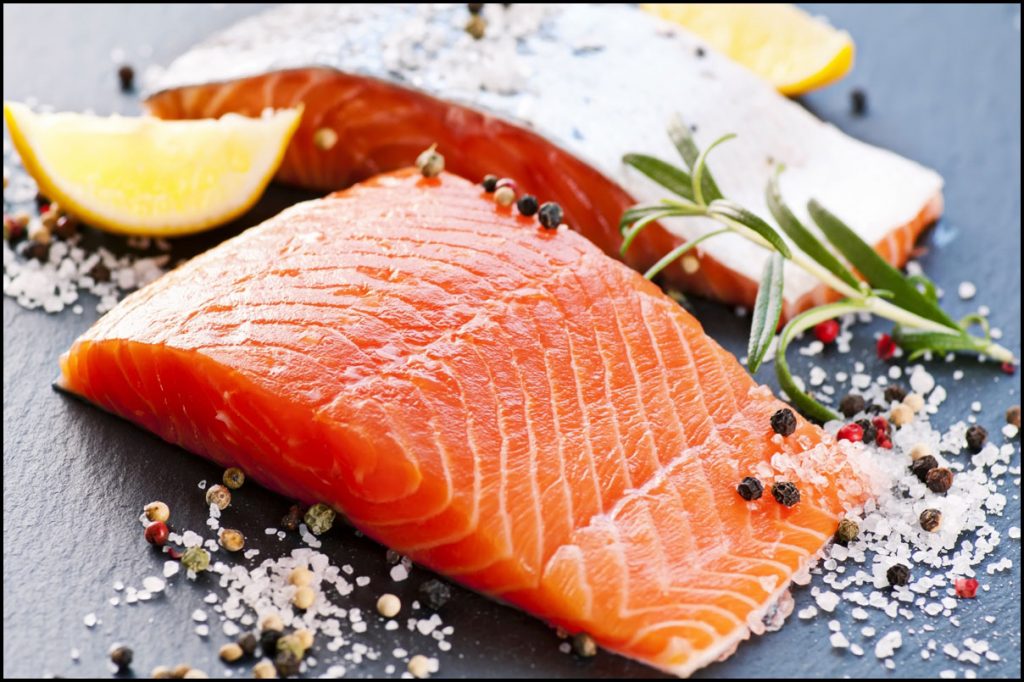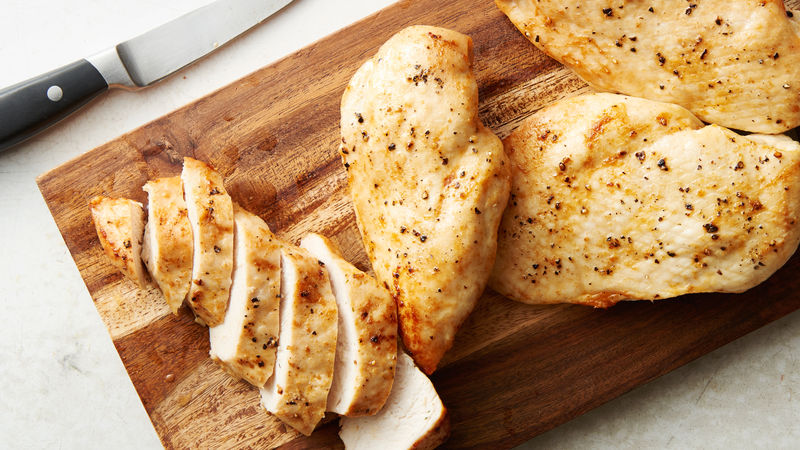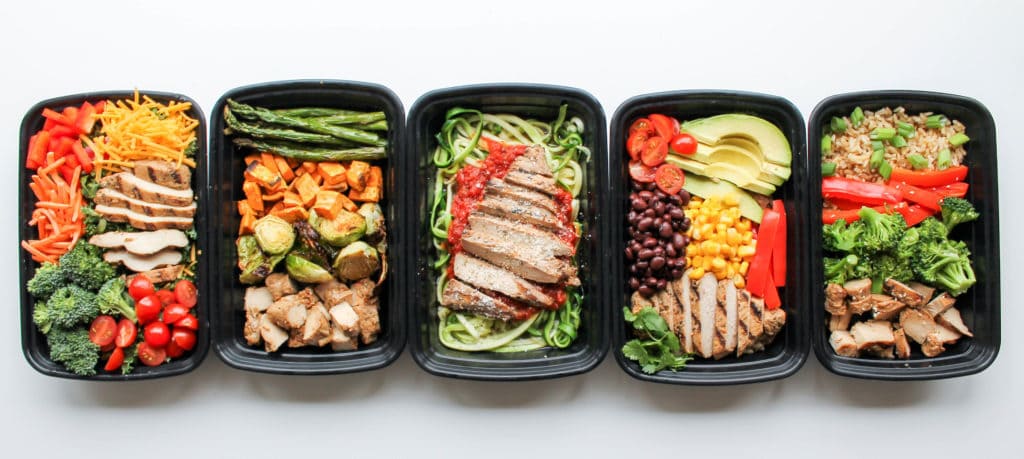You are in the gym training hard and the workout has really taken a toll on you. Once you are at home or your favourite food parlour you are torn between eating chicken or fish.
One of the number one goals for every bodybuilder is to have a high-protein rich diet. It doesn’t matter how hard you work in the gym; if you lack the right nutrition it will be hard for you to optimize muscle growth.
Chicken and fish both provide essential nutrition for bodybuilders. But realistically do these protein sources provide the same amount of nutrition. Or which one should put in bulk most of the time?
Let’s look at a few insights before we can take a look at the two protein sources.
High proteins and muscle growth
Bodybuilding is a great sport for gaining super muscular body.
Nothing compares to hitting those bench press or a strict press. These workouts touch every part of your body making your strong and super powerful. Charisma is the word that comes when bodybuilding is mentioned. Bodybuilding has lots of benefits including
- Boosts confidence levels
- Boosts your strength
- Boosts you physical strength
- A great lifestyle
Although hard workout is paramount for a physique body shape nutrition is as important as work out is.
Protein provides the building blocks for muscles when you are in the gym doing your workout you are certainly damaging fibres of your muscles. To achieve muscular physique strength training is the catalyst that helps in the formation of these blocks.
Protein for once is the real trigger for muscle building. Continuous workout breaks down your muscle mass. This will consequently break down your muscle tissue and hence the need to eat more proteins. Proteins help to repair the broken tissues.
Proteins have a lot to offer and here are some benefits:
- Increases body metabolism
- Helps maintain bone mass
- Helps in weight loss
- Keeps you feel bulk for long
High-quality protein foods
Animal products come with a bulk of protein and rank number one protein content. When it comes to powerful protein-rich foods meat, dairy and eggs prove their worth. For people who are vegan, there is no need to worry. Black beans and soy provide a good substitute for flesh with high contents of protein.
How to measure protein quality
Protein quality is basically measured based on its amino acid profile. Aminoacids are scientifically known as the building blocks for proteins. Protein is formed by several peptide molecules which in turn are formed by amino acids.
There are two classes of amino acids.
Non-essential amino acid: They include leucine and isoleucine. These amino acids cannot be synthesized by our bodies and hence you have to get them on your own.
Non-essential amino acids: These include alanine and glutamine. These can be made by our bodies if they cannot be found diets.
Foods that contain all essential amino acids are called complete proteins. Examples are:
- Eggs
- Dairy products
- Meat
- Fish
To ensure there is maximum synthesis protein, ensure that your diet is rich in almost all the essential amino acids. Without having these essentials amino acids your body will basically lack the needed amount to build muscle mass.
Protein
Protein digestibility corrected amino acids score
Apart from rating the quality of your food based on the number of amino acids present, we can achieve this by grading protein digestability. A maximum digestibility score is usually 1.0. By consuming these foods, there is a high chance of 100% of essential amino acids will most probably be absorbed by your body.
Based by a digestability score below are some high digestible protein sources;
- 1.0 – Chicken, beef, eggs
- 0.99 – mycoprotein
- 0.9 – Fish products
Fish vs Chicken-Whats the best for bodybuilders?
The key to progressive muscle growth is consumption of proteins. As a bodybuilder, you need first to plan your means and optimize on protein intake. Correct protein consumption ensures that protein the muscle synthesis the protein efficiently.
With different sources of protein being advertised, you want to ensure that you make the correct food choices. There are two common sources of protein commonly known. Fish vs chicken and here we break them down:
Fish

Fish are of different kinds each coming with own profile of nutrients. Whitefish normally provides more calories than chicken does. It provides over 170 Kcal per 100 grams. Fish is high in fat and as such the protein count is slightly low.
Fish is high in terms of micro-nutrition that provide essential vitamins like B 6 and B 12. Fish is easy to cook but it cannot match the versatility of chicken. Another drawback is the fact that fish is also smelly once open.
For bodybuilders fish comes in handy through the provision of vitamin D. It’s a steroid hormone that helps in muscle building while also boosts and enhances endurance.
Chicken

For most bodybuilders, there is always a high chance that chicken is a favourite for them. There are a lot of benefits that chicken meat offers that most people don’t yet get to know. Rice and, when served with chicken, is a common meal among bodybuilders. Chicken has a high protein serving ratio that stands at 31 grams at 100 grams.
Chicken is one of the easiest meals to cook and store. It is versatile too while you can add it to any kind of meal without major issues. It contains a small amount of magnesium and is rich in B6.
Which is the better option
Both fish and chicken are rich in protein essential for muscle building. They have high nutrient value and minimal calories making them ideal for bodybuilders. Protein is the most essential nutrient for muscle building and staying shredded.
Consuming different sources of proteins helps to supplement and nourish your body. A broad range of different proteins provides different micronutrients.
Add that protein boost to your diet every day and hit the gym hard. Thank me later for the muscular physique you will gain in a few weeks.
Want to reach your fitness goals faster?
Free eBook reveals the most effective cardio workouts and routines to get in shape and shed fat week by week!
You may also like
The ketogenic diet has become extremely popular over the last few years, and for good reason. This meal plan really works! The keto diet is not only effective as a weight loss plan, but may also help to improve health conditions such as diabetes and epilepsy. If you’re looking for an effective, affordable diet to try, keto may be the answer.
What is the Ketogenic Diet?
The ketogenic diet is a low-carb, high-fat, moderate protein diet. In general, a keto diet has a macronutrient breakdown of 5% carbohydrates, 70% fat, and 25% protein. Decreasing carbohydrates to this level forces the body to utilize fat as its primary source of energy. This induces a metabolic state known as “ketosis.”
The keto diet has been around for nearly 100 years. Since the 1920’s, doctors have recommended this diet to help ease the frequency and severity of seizures in children. While these dietary changes have been known to reduce epilepsy symptoms in children, it is still important to consult with a doctor about healthcare options.
Today, keto is most well known as a diet which causes rapid weight loss. The effectiveness of this diet have made it a popular, trendy choice in recent years.
What Should You Eat on a Keto Diet?
A keto diet is not defined by the food eaten, but rather by the consistent state of dietary-induced ketosis. This means that a wide variety of foods can be a part of a keto diet.

Typically, people following a keto diet will consume a large amount of fatty animal products such as red meat, poultry, fish, and dairy. However, vegans, vegetarians, and pescatarians can all go keto. Olive oil, coconut oil, grass-fed butter, and other sources of fat are common ingredients of a ketogenic diet.
Carbohydrate sources such as bread, starches, grains, most fruits, and, of course, sugary desserts, are entirely avoided. While this aspect of the diet may be difficult to maintain, limiting carbs is an essential part of keto.
What Is Ketosis?
When your carb intake is extremely low, your liver glycogen is depleted and your body is forced to begin burning fat. This state is called ketosis. Living in a state of ketosis is fantastic for weight loss, since it forces your body to burn fat from adipose tissue or dietary fat.

Being in a state of ketosis produces ketones, which are the byproducts of fatty acids. The three ketones produced are beta-hydroxybutyrate (BHB), acetoacetate, and acetone. Everyone has ketones in their body, but a ketosis diet creates a build-up of these acids. Ketones are released into the blood and are shuttled through the mitochondria where they are turned into energy.
Exercise and fasting are other ways you can deplete liver glycogen and induce ketosis. This is why intermittent fasting is frequently paired with a ketogenic diet. Alternatively, you could also take exogenous forms of ketones, which have been shown to increase BHB regardless of how many carbs you’re consuming.
Don’t We Need Carbs to Survive?
Carbohydrates are one of our main sources of energy. When we digest and metabolize carbs, glucose is produced. This is important, since there are certain areas of the brain that require glucose to function.
However, the human body is also capable of producing glucose from protein and glycerol, a type of fat. This process is called gluconeogenesis. Despite a very low intake of carbohydrates, your brain still gets all the glucose it requires to function. Thanks to this ability, we can survive without consuming glucose-rich carbs.
Researchers & Keto
A metabolic ward study, the gold standard in nutrition, tested the effectiveness of the keto diet. Participants were split into two groups. One group ate a ketogenic diet and the other group ate a standard American diet. Both groups were consuming the same amount of calories and protein.

The ketogenic diet group lost more weight in the first two weeks. Carbohydrates cause the body to retain water, so decreasing carb intake causes rapid water loss. This impressive head start is the result of both water and fat being lost.
However, by the end of the four-week trial, both groups had lost the same amount of fat. Participants following the ketogenic diet did have an increased overall caloric expenditure, but it was hardly detectable.
Isn’t Keto the Best Diet for Weight Loss?
There’s plenty of evidence that a ketogenic diet is great for losing weight, but is it the best? It turns out, when calories and protein are matched, a keto diet is no better for weight loss than any other high-protein, moderate carb, low-fat diet.
Many studies show that eliminating carbs leads to weight loss; however, this is largely because participants than end up eating more protein, which promotes greater weight loss. Protein is more thermogenic than fat and carbs. This means that the more protein you consume, the more calories you burn.

Generally, healthy, athletic individuals don’t need to do keto for any particular reason other than personal preference. In saying that, a very low-carb and high-fat diet does have utility among those who are insulin resistant. Research has made it clear that high fat, high protein, and lower carb diets are especially useful for controlling blood sugar and managing the metabolic dysfunction of type 2 diabetics.
Then Why Does Keto Work for Everyone I Know?
While keto may not perform perfectly in a controlled laboratory setting, it does seem to be superior when applied to real-world scenarios. Most people on a diet don’t track the precise amount of macronutrients and calories they consume with every meal, unless they’re using a meal plan service. Diets like keto can make weight loss effortless.
Keto diets may be effective for weight loss for the following reasons:
Food elimination: If you cut carbohydrates out of your diet, you’re taking a lot of different foods off the menu. Decreasing carb intake limits food variety, which can reduce the amount you eat, and therefore promote weight loss.
Gluconeogenesis: The process of converting fat into protein requires energy. That means that gluconeogenesis may burn additional calories
Increased insulin sensitivity: Insulin is a hormone which helps sugar move from the blood into other areas of the body. A resistance to insulin is often associated with obesity, weight gain, and difficulty losing weight. Increased insulin sensitivity, resulting from keto, causes weight loss and improved metabolic health.
Increased fat burning: Ketogenic diets help your body burn more fat while resting, doing daily activities, and exercising.D
Appetite Suppression:
Keto can be incredibly useful for weight loss, but not because it’s inherently superior, as many experts claim. The diet works well for weight loss because it helps people maintain a consistent calorie deficit. The primary reason keto helps people maintain a calorie deficit is through its effects on appetite.
According to a meta-analysis, participants following a ketogenic diet report less hunger and exhibit greater fullness. Research has shown that this may be due to the increase in ketones. Ketones have been shown to decrease ghrelin, which is frequently referred to as the “hunger hormone.”

When ghrelin levels are high, signals are sent to the brain which increases a person’s appetite. Decreased ghrelin levels cause a decreased appetite, and may lead to someone eating fewer calories over time. For this reason, a keto diet could lead to more significant weight loss results than a diet that keeps participants feeling hungry.
Summary
The ketogenic diet can be an extremely useful tool for weight loss. This diet is effective for many people since it can help reduce your appetite and control caloric intake. It’s important to remember that keto is not the only effective diet out there. What determines one person’s weight loss success will, of course, be different from another person. The ketogenic diet may give you incredible weight loss results; it’s merely a matter of finding which diet strategy works best for you.
Want to reach your fitness goals faster?
Free eBook reveals the most effective cardio workouts and routines to get in shape and shed fat week by week!
You may also like
The ketogenic diet has become extremely popular over the last few years, and for good reason. This meal plan really works! The keto diet is not only effective as a weight loss plan, but may also help to improve health conditions such as diabetes and epilepsy. If you’re looking for an effective, affordable diet to try, keto may be the answer.
What is the Ketogenic Diet?
The ketogenic diet is a low-carb, high-fat, moderate protein diet. In general, a keto diet has a macronutrient breakdown of 5% carbohydrates, 70% fat, and 25% protein. Decreasing carbohydrates to this level forces the body to utilize fat as its primary source of energy. This induces a metabolic state known as “ketosis.”
The keto diet has been around for nearly 100 years. Since the 1920’s, doctors have recommended this diet to help ease the frequency and severity of seizures in children. While these dietary changes have been known to reduce epilepsy symptoms in children, it is still important to consult with a doctor about healthcare options.
Today, keto is most well known as a diet which causes rapid weight loss. The effectiveness of this diet have made it a popular, trendy choice in recent years.
What Should You Eat on a Keto Diet?
A keto diet is not defined by the food eaten, but rather by the consistent state of dietary-induced ketosis. This means that a wide variety of foods can be a part of a keto diet.

Typically, people following a keto diet will consume a large amount of fatty animal products such as red meat, poultry, fish, and dairy. However, vegans, vegetarians, and pescatarians can all go keto. Olive oil, coconut oil, grass-fed butter, and other sources of fat are common ingredients of a ketogenic diet.
Carbohydrate sources such as bread, starches, grains, most fruits, and, of course, sugary desserts, are entirely avoided. While this aspect of the diet may be difficult to maintain, limiting carbs is an essential part of keto.
What Is Ketosis?
When your carb intake is extremely low, your liver glycogen is depleted and your body is forced to begin burning fat. This state is called ketosis. Living in a state of ketosis is fantastic for weight loss, since it forces your body to burn fat from adipose tissue or dietary fat.

Being in a state of ketosis produces ketones, which are the byproducts of fatty acids. The three ketones produced are beta-hydroxybutyrate (BHB), acetoacetate, and acetone. Everyone has ketones in their body, but a ketosis diet creates a build-up of these acids. Ketones are released into the blood and are shuttled through the mitochondria where they are turned into energy.
Exercise and fasting are other ways you can deplete liver glycogen and induce ketosis. This is why intermittent fasting is frequently paired with a ketogenic diet. Alternatively, you could also take exogenous forms of ketones, which have been shown to increase BHB regardless of how many carbs you’re consuming.
Don’t We Need Carbs to Survive?
Carbohydrates are one of our main sources of energy. When we digest and metabolize carbs, glucose is produced. This is important, since there are certain areas of the brain that require glucose to function.
However, the human body is also capable of producing glucose from protein and glycerol, a type of fat. This process is called gluconeogenesis. Despite a very low intake of carbohydrates, your brain still gets all the glucose it requires to function. Thanks to this ability, we can survive without consuming glucose-rich carbs.
Researchers & Keto
A metabolic ward study, the gold standard in nutrition, tested the effectiveness of the keto diet. Participants were split into two groups. One group ate a ketogenic diet and the other group ate a standard American diet. Both groups were consuming the same amount of calories and protein.

The ketogenic diet group lost more weight in the first two weeks. Carbohydrates cause the body to retain water, so decreasing carb intake causes rapid water loss. This impressive head start is the result of both water and fat being lost.
However, by the end of the four-week trial, both groups had lost the same amount of fat. Participants following the ketogenic diet did have an increased overall caloric expenditure, but it was hardly detectable.
Isn’t Keto the Best Diet for Weight Loss?
There’s plenty of evidence that a ketogenic diet is great for losing weight, but is it the best? It turns out, when calories and protein are matched, a keto diet is no better for weight loss than any other high-protein, moderate carb, low-fat diet.
Many studies show that eliminating carbs leads to weight loss; however, this is largely because participants than end up eating more protein, which promotes greater weight loss. Protein is more thermogenic than fat and carbs. This means that the more protein you consume, the more calories you burn.

Generally, healthy, athletic individuals don’t need to do keto for any particular reason other than personal preference. In saying that, a very low-carb and high-fat diet does have utility among those who are insulin resistant. Research has made it clear that high fat, high protein, and lower carb diets are especially useful for controlling blood sugar and managing the metabolic dysfunction of type 2 diabetics.
Then Why Does Keto Work for Everyone I Know?
While keto may not perform perfectly in a controlled laboratory setting, it does seem to be superior when applied to real-world scenarios. Most people on a diet don’t track the precise amount of macronutrients and calories they consume with every meal, unless they’re using a meal plan service. Diets like keto can make weight loss effortless.
Keto diets may be effective for weight loss for the following reasons:
Food elimination: If you cut carbohydrates out of your diet, you’re taking a lot of different foods off the menu. Decreasing carb intake limits food variety, which can reduce the amount you eat, and therefore promote weight loss.
Gluconeogenesis: The process of converting fat into protein requires energy. That means that gluconeogenesis may burn additional calories
Increased insulin sensitivity: Insulin is a hormone which helps sugar move from the blood into other areas of the body. A resistance to insulin is often associated with obesity, weight gain, and difficulty losing weight. Increased insulin sensitivity, resulting from keto, causes weight loss and improved metabolic health.
Increased fat burning: Ketogenic diets help your body burn more fat while resting, doing daily activities, and exercising.D
Appetite Suppression:
Keto can be incredibly useful for weight loss, but not because it’s inherently superior, as many experts claim. The diet works well for weight loss because it helps people maintain a consistent calorie deficit. The primary reason keto helps people maintain a calorie deficit is through its effects on appetite.
According to a meta-analysis, participants following a ketogenic diet report less hunger and exhibit greater fullness. Research has shown that this may be due to the increase in ketones. Ketones have been shown to decrease ghrelin, which is frequently referred to as the “hunger hormone.”

When ghrelin levels are high, signals are sent to the brain which increases a person’s appetite. Decreased ghrelin levels cause a decreased appetite, and may lead to someone eating fewer calories over time. For this reason, a keto diet could lead to more significant weight loss results than a diet that keeps participants feeling hungry.
Summary
The ketogenic diet can be an extremely useful tool for weight loss. This diet is effective for many people since it can help reduce your appetite and control caloric intake. It’s important to remember that keto is not the only effective diet out there. What determines one person’s weight loss success will, of course, be different from another person. The ketogenic diet may give you incredible weight loss results; it’s merely a matter of finding which diet strategy works best for you.

